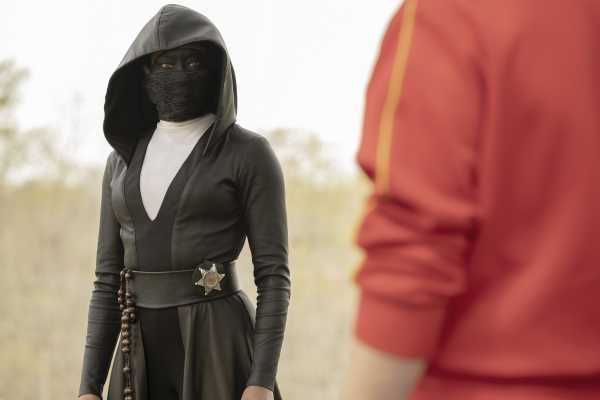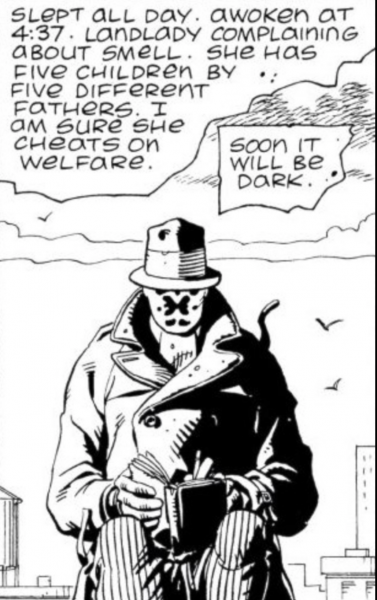
Despite glowing reviews from critics, HBO’s adaptation of Watchmen is proving to be divisive among some comic book fans. It’s not the acting or cinematography of the TV drama follow-up to the influential superhero story that they have a problem with. Instead, some disdainful viewers are outraged that showrunner Damon Lindelof’s Watchmen is too “political,” too entrenched in “identity politics” — too “SJW” (“social justice warrior”) — in ways that they think writer Alan Moore and artist Dave Gibbons’s original comic wasn’t.
Watchmen currently has a 46 percent audience approval score on Rotten Tomatoes, compared to its 96 percent critic approval rating. On Metacritic, it has a 6.8 positive audience score, with 35 negative reviews. In contrast, not one professional outlet listed on Metacritic gave the show an outright negative review.
The same is true on social media, where some fans have been talking about how they find the new Watchmen far more political than the one they grew up with.
But the story here isn’t about how critics and audiences perceive quality differently — enjoyment, after all, is subjective. Rather, viewers who bash the HBO show for being too political seem to ignore that the source material itself was a politically charged text, and that Moore was deliberately admonishing American power politics. But in Damon Lindelof’s Watchmen, those scathing criticisms that Moore embedded into the comic series become impossible to ignore.
Watchmen was created as a cautionary tale of extreme right-wing politics, but hasn’t always been interpreted that way
Watchmen is a superhero story, and decades of superhero stories have trained their captive audiences to identify with the hero, root against the villain, and celebrate when the hero saves the day.
But Watchmen is not a typical superhero story. Almost none of the superheroes in the story have powers. They’re just regular humans, flaws and all, who have taken it upon themselves to be the heroes their community needs, and believe themselves to have more of a say than regular people about what is good and isn’t good for humanity. What was unique about Watchmen when it debuted in 1986 was that it was fully cognizant of how American politics would set the rules for superheroes, if they existed in the real world.
By setting the dystopian fantasy in an alternate version of 1986 America, one in which President Nixon was still in charge, Gibbons and Moore downplayed the political messages at the story’s core — distrust of authority; critiques of an objectivist, right-wing moral code; skepticism of government “heroes” like Ronald Reagan — with Gibbons often arguing that the book is open to many interpretations, including political ones.
“I’ve now come around to thinking that the twelve issues of Watchmen are actually less like a Rorschach test for the reader and more akin to … a blizzard of words and pictures much like the seething broadcast information from which Ozymandias himself attempts to distill meaning,” he wrote in the 2017 annotated version of Watchmen, explaining how he’s come to see the book as less open to interpretation and more a flurry of messages for the reader to unpack at their will.
Moore even purposely set Watchmen in an alternate timeline, because he was afraid that people might be too hung up its politics.
“I also wanted to write about power politics,” Moore told Entertainment Weekly in 2005 of the creation of Watchmen. “Ronald Reagan was president. But I worried readers might switch off if they thought I was attacking someone they admired. So we set Watchmen in a world where Nixon was in his fourth term because you’re not going to get much argument that Nixon was scum!”
Moore has been pretty explicit about the real-life political critiques he was mashing into the bones of his book: Moore was not a fan of President Ronald Reagan’s and Prime Minister Margaret Thatcher’s conservative politics and policies at the time, and those feelings are apparent to keen readers.
Related
In 1986, Watchmen skewered the way we love superheroes. It’s still as relevant as ever.
Rorschach is the avatar of Watchmen’s politics. Not everyone can see that.
At the heart of the political reading of Watchmen is the book’s most misinterpreted character: Rorschach, a vigilante who both stands up for the truth and acts violently against those whose beliefs he abhorred.
While Rorschach, in the book, nobly abstains from the other former superheroes’ plan to cover up villain Ozymandias’s dastardly deed — killing millions of innocent people to avoid a nuclear war — his moral code is pretty repugnant. He constantly breaks the law, because he thinks himself above the law. He also has a very black-and-white view of justice, preferring to take matters into his own hands (which usually results in violence). And in his journal entries, he’s paranoid, nihilistic, and sees the worst in people — usually the poor, immigrants, and women.
Moore has said Rorschach is an homage of sorts to the comics artist Steve Ditko and his right-wing ideologies, drawn from writer Ayn Rand’s polarizing theory of objectivism that Moore vehemently disagreed with; Moore called Rand a white supremacist with burnt ideas.
Moore, who identifies as an anarchist, has said in interviews that he wanted to show how this black-and-white idea of good and bad and strict moral conservative code would work in a superhero world with real consequences. Rorschach’s superficial notions of good and evil are a lot easier to convey in a comic book narrative in which the stakes are heightened. (Think of Thanos snapping half of the population away in Avengers: Infinity War).
To Rorschach, people always have the ability to be good. If they aren’t good, by his standards, it’s their own fault for not achieving his benchmarks. Despite calling himself a hero, he has no will to help those who fall on the wrong side of goodness — he sees them as oxygen thieves of society.

Rorschach’s rigid standards have won him adulation over the years, despite Moore and Gibbons’ goal otherwise. In 2015, headed into the fight to become the Republican presidential nominee, Sen, Ted Cruz said one of his favorite superheroes of all time was Watchmen’s Rorschach, which spurred several think pieces defending the character’s heroism — not unlike those about whether director Zack Snyder’s respectful portrayal of Rorschach as a hero in his 2009 film adaptation of the story was appropriate. And every so often, there are extensive Reddit debates and Quora queries about Rorschach’s heroism.
“He’s willing to risk his life and die for that belief,” Jim Geraghty wrote for the National Review in 2015, praising the character. “Sure, Rorschach is a violent, emotionally-damaged, obsessive vigilante, but all of the characters in this story are pretty deeply flawed.”
In an interview with Comic Book Artist magazine from 2000, Moore speculated as to what could lead to the misinterpretation of Rorschach: People who clearly see Rorschach as an empathetic hero, he said, are “people who might secretly believe themselves to be part of the elite and not part of the excluded majority.”
In a regular world where no one is super-powered, Rorschach becomes more of a monster. His thoughts on the uselessness of women, people of color, LGBTQ people, and those who are disabled or mentally ill are more clearly disturbing: He isn’t any better than the world around him, yet considers himself superior and conducts his “superheroism” in the same fashion.
In Moore’s view, readers who don’t see Rorschach’s worldview as nihilistic and reprehensible are often like Rorschach himself: unable to see the problem with believing in such rigid, self-interested moral codes.
They see society as Rorschach does; everything is a me vs. them situation. Buying into this sort of victimhood is a toxic way to read a toxic character — not only does it allow readers to ignore the conservative political implications of Rorschach’s beliefs, but it leads them to pump up an undeserving star.
HBO and Damon Lindelof made Watchmen more explicit by focusing on race
The disconnect between how Watchmen’s creators thought of Rorschach and how some fans have perceived him — a self-interested nihilist vs. an inspirational thought leader — brings up the timeless topic of an artist’s intent versus their audience’s interpretations.
But based on this renewed defensiveness from Watchmen fans about the alleged lack of politics in the original text as compared to the HBO show, perhaps Moore has proved his point. He has said that the people who scared him most were Americans, during the time of Reagan, who believed themselves to be invincible.
“My personal feelings, because I’m the writer and can do anything that I want, is that at the moment a certain part of Reagan’s America isn’t scared,” Moore told the Comics Journal in 1987. “They think they’re invulnerable. There’s this incredible up mood that leads at its worst excesses to things like the Libyan bombing and things like that, and they worry me and frighten me.”
What the team behind HBO’s Watchmen has done to make sure its viewers are appropriately “scared” is to be more explicit in illustrating the dangers of political and social elitism, by using much closer-to-home examples. HBO’s Watchmen makes the political underpinnings of the text overt from the beginning, referencing America’s history of racial turmoil to set the groundwork for the story’s related present-day concerns.
Related
HBO’s Watchmen tells stories about America’s racist past in America’s racist present
The show opens with the Tulsa, Oklahoma, massacre of 1921, an event in which white mobs burned down a black community and killed hundreds of black residents in the process — a response to black World War I veterans trying to prevent a lynching. In the aftermath of the attacks, Oklahoma’s governor declared martial law and called in the National Guard. It arrested all surviving black residents who weren’t already imprisoned, jailing them for as long as eight days.
People with power putting themselves above the law and inflicting their brand of “justice” has punctuated America’s history. And as was the case during the riots in Tulsa, and others like them in Chicago, Atlanta, and Los Angeles, the people who are in power has always been directly tied to race.
Watchmen on HBO makes that a key theme more obviously than the comic does. Perhaps the show’s boldest move to fans of the character could be that Rorschach, who has long since died, is now deemed a white supremacist, and his followers domestic terrorists; he helps illustrate the ties of race and power. And while the Watchmen television show seems to operate within the same alternate history as the original comic, these elements of white supremacy, domestic terrorism, and police brutality are all currently topics of national conversation. Their modern relevance helps to close the distance between reality and fiction that the graphic novel made more of an effort to keep apart.
In Moore and Gibbons’ version of Watchmen, giving someone unrestrained authority is a recipe for disaster. Lindelof pushes that question further and glances into American history to draw on that same theme, but from the point of view of black men and women — people who have been ostracized, belittled, dehumanized. People who someone like Rorschach would have loathed.
Through this lens, it’s both harder and more uncomfortable to ignore abuses of power. Watchmen on HBO makes it clear who holds that power in America’s history (traditionally white men), and for viewers who share these scions’ skin color and gender, the impact of racial supremacy on this superhero society can be a painful truth to contend with. The Watchmen TV show relentlessly emphasizes that white people’s abuse of power has shaped the lives of everyone around them, particularly those who are not white and powerful.
What bears repeating is that Lindelof’s adaptation might be a bit more difficult and uncomfortable, but it’s essentially telling the same story of power politics that Moore was. It’s just that in 2019, Watchmen’s alternate America isn’t quite as far away from our own.
Sourse: vox.com






